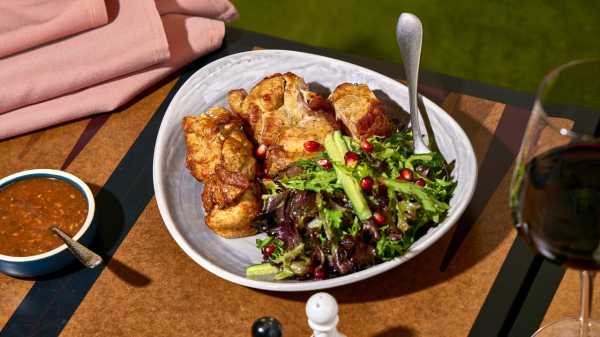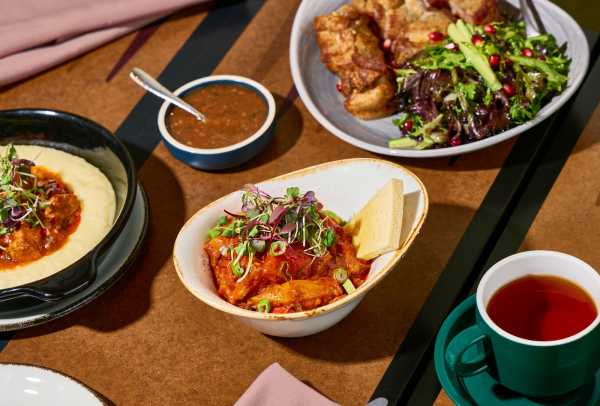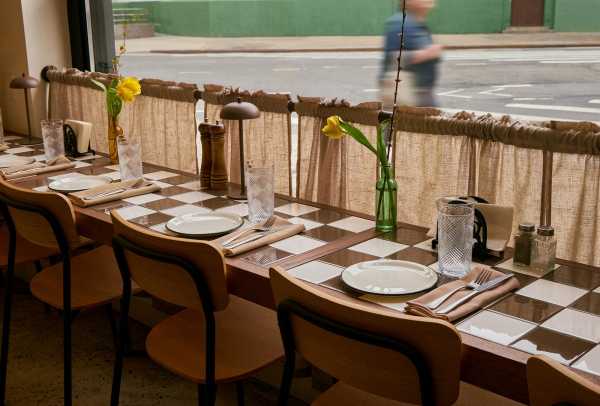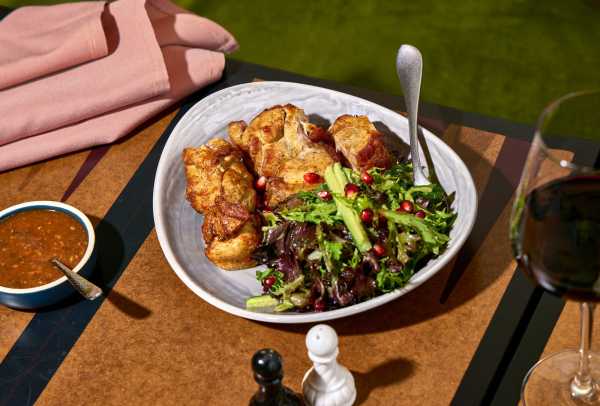
Save this storySave this storySave this storySave this storyYou’re reading the Food Scene newsletter, Helen Rosner’s guide to what, where, and how to eat. Sign up to receive it in your inbox.
The exterior of Laliko, a sleek new restaurant in the West Village, bears the restaurant’s name over the door and, above the large plate-glass window next to it, a backlit subtitle: “Stories of Georgia.” There’s not much outright storytelling inside; in a cosmopolitan sort of way, neither the staff nor the menu explains very much about the food—This is one of the world’s great cuisines, their restraint seems to say. Shouldn’t you know the deal by now?—though the cooking itself speaks quite clearly. Georgia, a crenellated swoop of the South Caucasus tucked between Turkey, Russia, Azerbaijan, Armenia, and the Black Sea, is a resolutely and richly agricultural place, its valleys full of farms and orchards, grapevines greening seemingly every hillside. (On a visit to Tbilisi nearly a decade ago, I was shocked to realize that even the tomatoes at a McDonald’s near the airport were as red, juicy, and complex as the best of the farmers’-market fare back home.) Its cuisine is fragrant, bold, and poetic, a feast of simmered stews and grilled meats, gently spiced, overlaid with bright and sour harmonics from fresh herbs and tart, fruity vinegars. You can practically see the line of the Silk Road in the khinkali, steamed soup dumplings, whose subtle fillings of soft lamb or mild cheese look west, to the pierogi and pelmeni of Eastern Europe, while their pinched-pillow exteriors and slurpy, savory broth point east, to China’s xiao long bao.
At Laliko, which opened in March, the khinkali are excellent, plump and floppy, their springy dough rolled to a porcelain thinness, their twisted tops pleated pleasingly. You can order them in sets of four, or splurge on the absurd, delightful, and unabashedly social-media-friendly Mother Khinkali, a mega-dumpling with the diameter and luminosity of a birthday-party balloon. Upon its arrival at your table, a server will present for inspection an ornate silver dagger, pull it with a flourish from its curved sheath, and proceed to saw off the head of the Mother at approximately her Tropic of Cancer. Inside are nestled a half-dozen standard-size dumplings of your choice, like nothing so much as a clutch of tiny, steamy babies, with a few drifts of black pepper freshly ground over the top. Sure, they taste exactly the same as a parentless khinkali, but such frank showmanship, in what’s otherwise a pretty straightforwardly chic little restaurant, really is a lot of fun.

The ratatouille-ish ajapsandali is served with a nutty wedge of hard cheese.
Laliko is the first American venture from Gurami Oniani, whose Guliani Group operates some thirty-odd establishments in Tbilisi and Moscow. Oniani has said that he hopes to bring his country’s food to the world, and that Laliko will be the harbinger of a grand flowering of Georgian restaurants across North America. New York is perhaps a curious place to launch his campaign as culinary ambassador: the cuisine is already quite well represented here, not just in the post-Soviet enclave of Brighton Beach but at dozens of Georgian restaurants, at all fanciness levels and price points, throughout Manhattan and Queens. (I love the ekala pkhali, a sort of dip made with a Georgian variety of spinach, at Chama Mama, a restaurant with several Manhattan and Brooklyn locations, and on sunny days you could do worse than to swing out to Little Georgia, a tiny bakery around the corner from the elevated subway tracks that run above Brighton Beach Avenue, pick up a just-baked, cheese-filled pastry to go, and walk a block to the boardwalk, to eat it by the chilly water.) Maybe the idea is that, if Laliko can stand out here, and perfect its formula, Oniani will know it’s ready to head out into the rest of the American wilderness.

Tile-topped tables anchor a dining room that feels both contemporary and textured.
The restaurant’s head chef, Manuchar Tsikolia, is joined in the kitchen by Ruslan Giorgberidze, a dedicated khinkali cook (and an alumnus of Khinkali House, a Guliani Group restaurant in Moscow), as well as Jimi Kurtanidze, a cook dedicated full-time to khachapuri. Laliko offers a few varieties, the same greatest-hits collection you’d expect to find at any Georgian restaurant: imeruli, stuffed with cheese and mint; megruli, with cheese inside and extra cheese broiled over the top; and adjaruli, the most famous and visually flamboyant variety, an open-faced boat of bread baked with an exorbitant amount of cheese and topped with an egg yolk and a whopping amount of butter, stirred together in their doughy vessel into a dairy-aisle gestalt—an audaciously rich, all-in-one efficiency of bread and spread.

The pork mtsvadi, accompanied by a salad dotted with pomegranate seeds.
As at any Georgian restaurant, you’ll want to get a glass or two of wine at Laliko. Georgia is rightfully proud of its claim to being the birthplace of wine, and its viniculture is unlike any other, with indigenous varietals that are nearly impossible to find elsewhere. Grapes are fermented—often with skin, seeds, stems, and all—in large earthenware vessels, known as qvevri, that are buried underground. The resulting nectars, often beautiful and bizarre, pair satisfyingly with Tsikolia’s cooking. I especially enjoyed a glass of amber Rkatsiteli, with fruity and grassy notes, alongside a light, spring-like stew of veal simmered with wine and tarragon, then spooned over a delicately bitter celery-root purée; a glass of tsinandali, white and apple-juicey, was wonderful with an exceptionally crisp-skinned roasted half chicken, served in a velvet pool of walnut sauce. Ajapsandali, a ratatouille-ish mishmash of eggplant, peppers, and tomatoes, is spiced sharply with garlic and floral notes of coriander seed, and served with a nutty wedge of hard cheese. I was struck by the unexpected complexity of what the menu calls “Georgian Salad,” a bowl of sliced cucumbers, tomatoes, red onion, and fresh herbs tossed in a dressing made with sultry, mellow sunflower-seed oil brought over from Kakheti, a region in the east of Georgia. I adored the pork mtsvadi, grilled hunks of meat marinated in pomegranate juice and cooked over wood smoke till they took on a distinctive char. Even better was the purple plum sauce that can be ordered as a side, puckery and sweet, bright and strange.
Helen, Help Me!
E-mail your questions about dining, eating, and anything food-related, and Helen may respond in a future newsletter.
The dining room at Laliko is both contemporary and textured: wood cladding along one wall; vaguely medieval-feeling murals on another. A mounted ladder soars up to a double-height shelving system that holds bottles and bottles and bottles of wine. Some of the seats are chairs, and some are backless ottomans (surprisingly comfortable!), plus there are velvet-topped benches that surround a long, tile-topped communal table anchoring the room. The table, starkly modern and geometric, rests atop an antique blue-and-red patterned Georgian carpet. The metaphor is obvious but apt: the sharp-cornered present resting on the beautifully durable past. ♦
Sourse: newyorker.com
